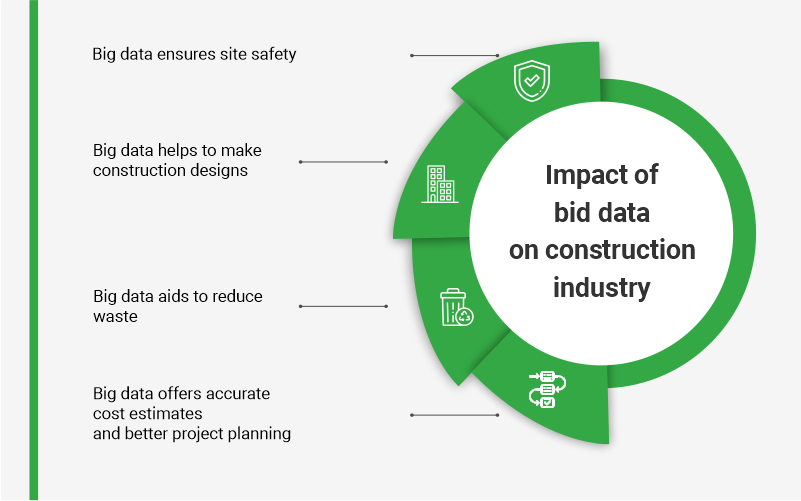The construction industry has undergone much advancement over the last few years. The construction industry has incorporated technology into its projects. The traditional methods of construction have become a talk of the past. Project planning, budgeting, site inspection, and data management are currently noted through technology. A significant surge has been seen in the increasing demand for construction data. This big data are crucial and complex. So what is this big data? Read on to get a better understanding of big data and the way it impacts the construction industry.
An Insider Guide To The Understanding Of Big Data And Its Purpose In The Field Of Construction
Big data are complex data sets that are produced from new data sources. Consider big data as a mall that houses products from established brands and startups. Like in the mall, one can find groceries, clothes, and electronics under the same roof. Similarly, big data houses emails, construction project records, customer databases, documents, mobile apps, and internet clickstream logs under one roof. Now that you understand big data let’s progress ahead.
What is Big Data Analytics?
Big data is created from a myriad of sources and contains several records. Analysing every record manually proves to be a hassle. But thanks to advanced technology, this work is made easy with the help of big data analytics. Wondering what is big data analytics? Well, big data analytics is a way of uncovering information such as market trends, and correlations hidden patterns from the obtained data. It uses advanced analytic techniques to evaluate the large and diverse data sets that are structured and collect necessary information from them. Big data analytics is just like google analytics which helps to understand the top google searches, trending keywords, views of the people, popular websites, and way more.This big data and its analytics play a vital role in advancing the construction industry. But before moving there, let’s get an understanding of how the construction industry relies on data analytics.
Impact of data analytics on the construction industry

The construction industry for years struggled with bad planning, budgeting, miscalculations, cost overruns, and task mismanagement. Data management and analytics helped to deal with these challenges. Data analytics helped with project completion and boosting productivity. It also helps with risk prediction, construction planning, equipment, and asset tracking, process optimization, product development, and accurate budgeting.
4 Ways In Which Big Data Contributes To Construction Industry
The construction industry is a sector that is abundantly dependent on big data. The market size of the construction industry started to soar post-pandemic due to the use of big data. Builders, contractors, and project managers relied heavily on the construction industry for project reports, crisis management, supply chain tracking, data storage, and budgeting during the pandemic situation. Big data plays a crucial role in advancing construction projects in the present times. Here’s a list of ways in which big data has contributed to the construction industry.
Planning and Budgeting
Big data helps with producing accurate cost estimates for projects, materials, and equipment. Big data tools also help with budgeting, planning labor wages, and reducing expenditures and expenses. The use of big data enables better budget management and aids in finding timely solutions for the crisis.
Design
The construction industry makes use of data-driven tools like BIM and AI for the creation of digital designs. Often environment and historical data are stored in these tools for making design predictions. The designers make use of the stored data to plan designs accordingly. The data software also helps to store clients’ details and feedback. Big data helps to inform the clients, stakeholders, builders, and project managers about the possible design changes.
Waste reduction
The construction industry generates tons of waste every year. Due to logistics mismanagement, building materials and equipment are wasted every year. The use of big data analytic tools provides a report of the wasted and unused products. Big data tools provide the project teams with real-time access to logistics information thus enabling efficient delivery and usage of materials and equipment.
Ensures site safety
The use of sensor-driven big data offers insight into the productivity and efficiency of sites, equipment, machines, and wearable devices. Big data helps to monitor the environmental conditions of the sites and workers. Biometric sensors in wearable devices store worker health data. The use of big data helps to avoid site accidents and worker casualties.
The merge of big data analytics with construction technology has leveled up the game of the construction industry. Big data can have an edge over its competitors. Harnessing the power of big data brightens up the future of the construction industry.
About Author
Olivia Jones
Technology Specialist
Olivia is a highly skilled and experienced Technology Specialist with 10+ years of hands-on expertise in the rapidly evolving field of technology. She has a proven track record of successfully implementing and managing a wide range of technological solutions, ensuring optimal performance and efficiency. Olivia possesses a deep understanding of industry trends and emerging technologies, enabling her to provide strategic guidance and drive innovation within organizations. With a strong focus on problem-solving, she consistently delivers tailored solutions that align with business objectives while maximizing productivity and cost-effectiveness.
About SoftTech Engineers
A leading IT company (www.softtech-engr.com) facilitating business and technology transformation across the AEC industry through innovative software products and solutions. Equipped with 25+ years of deep domain expertise and industry knowledge, SoftTech has helped more than 4500 clients & government organizations, with more than 25000 users in India and around the world to gain a competitive edge and lead from the front in the industry.

